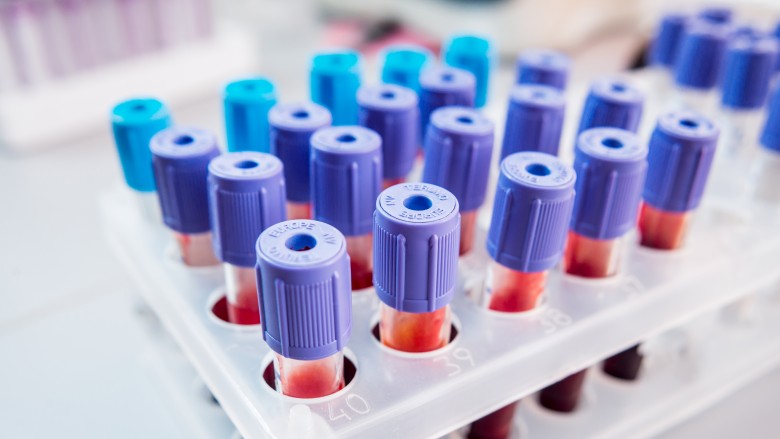What Really Happens When You're Low On Vitamin D
As we're (thankfully) nearing the end of winter, many people are expressing their gratitude at the impending return of more sunlight and vitamin D. If you're like me and live in the higher latitudes far from the equator, you've probably been told more than once that it's difficult to get enough vitamin D during the long, dark winters.
Still, it came as a surprise to me this winter when after six weeks of being sick and exhausted, my doctor ordered a vitamin D test and it turned out my levels were very low. In fact, they were low enough to warrant a vitamin D prescription! This led me to wonder how common this is throughout the world and what kinds of symptoms might clue you in to the fact that you're low on vitamin D. I spoke to doctors, dietitians, wellness experts, and fellow sufferers of low vitamin D to find out what really happens when your levels are low.
What is vitamin D?
First off, what is vitamin D and why does it matter? According to Dr. Scott Schreiber, a chiropractic physician double board certified in rehabilitation and clinical nutrition, vitamin D does much more than we used to think. "Traditionally, vitamin D was thought of as a bone building vitamin, but current research has shown it to be involved in much, much more," he told me. "Every cell in the body has vitamin D receptors." Sounds important, right? It is, which is what makes it so shocking that many people aren't getting enough. According to Dr. Schreiber, vitamin D deficiency impacts over 80 percent of the population! So how might you know if you're one of the over 80 percent affected?
Dr. Lisa Ashe, the medical director of the Be Well Medical Group told me it isn't always so easy to tell. "Many people have no symptoms or they are so subtle that they're unaware until they receive the results of blood testing at the doctor," she said, though there are some signs signaling that you should ask your doctor for testing.
Your mood might change
Dr. Schreiber also told me that vitamin D is responsible for activating genes that regulate neurotransmitters, and that these directly affect brain function and development. It's no surprise then that low vitamin D has been linked to depression, particularly seasonal affective disorder that is experienced in the winter months when there is less sunlight.
"There have been several studies showing that as vitamin D levels decrease, due to less time outside, depression increases," Dr. Schreiber said. "The lower [vitamin D] goes, the worse [depression] becomes." Have no fear though, Dr. Schreiber said that vitamin D supplementation has been shown to relieve depression symptoms.
Your digestion could suffer
Irritable Bowel Syndrome (IBS) is a digestive disorder that affects between 25 and 45 million people in the United States, with 67 percent of those being female. Why am I talking about diarrhea, constipation, and abdominal pain all of a sudden when you came here to read about vitamin D? It isn't that much of a stretch.
It turns out that high vitamin D supplementation can reduce the symptoms of IBS! You can add your digestive tract to the list of things you never thought would be affected by how much sunlight you get.
You may stay sick
If you always seem to be sick, no matter what precautions you take, or your illnesses seem to linger longer than they do in other people, you may have low vitamin D. "Vitamin D has been shown to increase the ability of T cells to fight infection," Dr. Schreiber told me.
Claudia Matles, a wellness coach who often sees clients low on vitamin D, agreed adding that significant deficiency could play a role in Type 2 diabetes, hypertension, asthma in children, cardiovascular disease, and even multiple sclerosis and cancer! If you just can't seem to kick that cold after several weeks, ask your doctor to test your vitamin D levels. That's exactly how my own issue was detected this winter.
Your muscles and bones might ache
Dr. Gordon Crozier told me that in addition to making you more prone to infections and viruses, low vitamin D may lead you to "develop bone and muscle pain, have chronic fatigue-like symptoms, and develop hair loss." He added that low levels of Vitamin D can even mimic chronic fatigue and fibromyalgia symptoms.
According to the Vitamin D Council, there is mixed evidence about whether true fibromyalgia and low vitamin D may be linked causally, however, vitamin D has been used to treat fibromyalgia pain and may help reduce symptoms!
You may get stuck in a brain fog
Varda Meyers Epstein has suffered from chronic vitamin D deficiency for 20 years and told me that the biggest issue for her is brain fog. "When it's bad, my brain goes foggy and it becomes a real struggle to follow a recipe or do my job," she said, adding that the forgetfulness is especially frustrating because then she forgets to take her vitamin D, creating a vicious cycle.
Unfortunately, this isn't uncommon. Low levels of vitamin D have been linked to cognitive impairment in several studies, so what Epstein describes may apply to you too. "It's difficult to describe the brain fog. Like I'm underwater, or not quite awake. Like I need coffee, but no matter how much I drink, I can't wake up." Still, it wasn't symptoms that led to her initial diagnosis.
"My doctor ordered a vitamin D test along with the rest of my labs because the deficiency is common among orthodox Jewish women who cover their hair. The same is true of Muslim women who wear burqas." Epstein said that regardless of whether you cover your hair, if women are feeling depressed for no reason and just generally "yucky" they should ask to be tested. "It's a simple test and there's a simple remedy," she said, adding that supplements have helped her a great deal over the years.
You might feel fatigued
Registered Dietitian Gillean Barkyoumb told me that the most overlooked symptom of low vitamin D is fatigue. "Even modestly low levels of vitamin D can have a negative impact on energy levels," she said. "We often blame tiredness on other things such as demanding schedules rather than considering low vitamin D levels."
Luckily, this is a fairly easy fix. A recent study showed that supplementing with vitamin D significantly decreased fatigue compared to placebo, and that the greater the amount of vitamin D, the more improvement researchers and participants saw. This may also explain why we have more energy in the summer and feel a bit lazier in the winter. Who knew?
You could have pregnancy complications
Sonographer Nancy He who owns Baby Glimpse, a 3D/4D ultrasound center in Australia, told me she has seen complications in pregnancy and in newborns because of low vitamin D. "Unborn babies derive their vitamin D directly from their mother's reserve," she told me, adding that deficiencies have been linked to poor bone growth, soft bone, and Rickets disease as well as mental issues.
"For pregnant women vitamin D deficiency has been linked to complications such as preeclampsia, low birth weight, and gestational diabetes," she said. "Vitamin D supplements are advisable for most pregnant women."
Low vitamin D versus deficiency
Wellness Coach Claudia Matles told me that there is a difference, medically speaking as well as in terms of symptoms, between low vitamin D and vitamin D deficiency. She explained that 25 OHD (hydroxyvitamin-D) is the chemical compound found in the body to make vitamin D, and that this is what your doctor will test for, to determine if you are low or deficient for vitamin D. "Low vitamin D is considered when blood levels of 25 OHD fall below 32 nanograms per milliliter (ng/mL). Deficiency occurs when the levels of 25 OHD are lower than 20ng/mL."
Still, even if your levels put you in the "low" range and not in the "deficient" danger zone, you symptoms should not be ignored or left untreated.
What puts you at risk for low or deficient vitamin D?
While all of the experts I spoke with emphasized that low vitamin D is a common issue worldwide, there are some factors that can put you at greater risk of low vitamin D levels. Since the body makes vitamin D when exposed to sunlight, dietitian Gillean Barkyoumb told me that you may have low levels if you "are homebound, live in northern latitudes, wear clothing that covers your skin, or have a job that limits sun exposure."
Dr. Ashe added that following a vegan diet can also contribute to vitamin D deficiency. "The foods where vitamin D is naturally occurring aren't included in this type of diet," she said. This is because most natural sources of vitamin D are animal-based including fish, fish oils, and fortified milk. Dr. Ashe also said dark skin can put you at greater risk of low vitamin D because melanin reduces vitamin D production when exposed to the sun.
Treatment for low vitamin D or deficiency
If you have low levels of vitamin D, you can treat it through diet and supplements (as well as getting more sun exposure). Registered Dietitian Rachel Begun, who is also a spokesperson for Sundown Naturals vitamins, told me it's always best to maximize nutrient levels through food first.
"Focus on naturally-occurring sources of vitamin D — like fatty fish and fish oils, egg yolks, and beef live r— as well as your favorite fortified foods," she said, adding that some conditions like celiac disease, Crohn's disease, and cystic fibrosis can make it even more difficult to absorb vitamin D from food. "If diet isn't enough, talk with your doctor about whether it makes sense to take a vitamin D supplement and if so at what dose."
While you may be able to get by with naturally-occurring vitamin D or an over-the-counter vitamin D supplement, you may be like me and require a little extra punch to hold you over until we can once again bask in the sun of summer (with sunscreen, of course).












